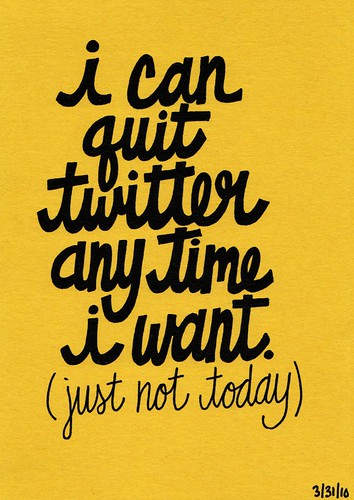
![]() Photo Credit: Carolyn Sewell via Compfight
Photo Credit: Carolyn Sewell via Compfight
This is the way we have learned to talk about ourselves:
“I want to quit smoking, but I can’t.”
“I want to stop fighting with my kids every day, but they won’t let me.”
“If only she would go out with me, then I will be happy.”
“If only I didn’t drink so much.”
“I wish I could exercise more, but it’s just too hard for me.”
“I’m sorry, that’s just the way I am.”
We love phrases like this, because they alleviate us from the burden of responsibility for our own actions. They allow us to blame something or someone else (or even a distinct aspect of our personality) for our own inaction, thereby allowing us to maintain the status quo that we secretly want to hold on to (even while we publicly complain about it.)
A few months ago, I wrote about the theories of control in relationships (see “You Are in Control, You Just Don’t Know It“) as put forth by Ernst Beier, author of “People-reading: How we control others, how they control us.” Beier says we secretly control those around us with the behaviors that are carefully (if unconsciously) selected to elicit exactly the responses that we want to get.

![]() Photo Credit: JOSE VICENTE JIMENEZ RIBAS via Compfight
Photo Credit: JOSE VICENTE JIMENEZ RIBAS via Compfight
And according to Beier, we also control ourselves, even if we like to pretend that we can’t. The smoker, for example, who says, “I hate smoking, but I can’t quit,” doesn’t really hate smoking at all. He loves smoking. But he hates appearing like he loves smoking. So he finds an acceptable compromise (as Beier says, “he is doing just what he wants to do—talking about quitting while smoking.”)
“If he honestly wanted to give up the entire pattern,” says Beier, “he would stop smoking at once.” But why bother when he can just complain about his own behavior in a way that removes all responsibility?
According to Beier, this is the human way. In public, we extoll the virtues of our society. But privately, we work towards our own private goals. Ugly goals. Selfish goals. Our deep desires that are so hideous to us that we don’t even want to recognize them ourselves, let alone share them with others.

Photo Credit: Ricardo Liberato via Compfight
Publicly, we become spin doctors. We use fancy language to convince ourselves and others that we are virtuous after all. As Beier says, “the aim is not to be proper and ‘good,’ but simply to get people to believe that we are.”
Another example Beier gives is when people say, “I don’t want to sound impatient, but . . .” Actually, impatient, is exactly how they want to sound. Or more accurately, as Beier says, they “want to sound impatient without sounding impatient.”
If you want to be a smoker, a drinker, argumentative, lazy, out-of-shape, or whatever, that’s fine. But stop bullshitting yourself about it. Own it. Don’t say, “I’m sorry, but that’s just the way I am.” Don’t apologize for being exactly the way you want to be.
But if you do want to change, own that too. Less talk and more action. Less bullshit and more behavior. The best way to measure what you really want, is by looking at what you already have.
—
References and recommended reading:
Beier, E. G. (1989). People-reading: How we control others, how they control us. Scarborough House.
Beier, E. G. (2002). A Question of Belonging. New Century Books.
by Jeremy McCarthy
Connect with me on facebook, twitter, or pinterest.
Now available: New e-book on The Psychology of Spas and Wellbeing.

Interesting – so we do away with all the social mores and behave as we are?? Not sure if I would like to live in that world.
The last sentence is the clincher for me … nothing like taking a good, hard, honest look at what you already have! Talk about self-motivation!
Thanks for the intro to E.G. Beier. Talking yet taking no action is a tedious habit I don’t care for either.